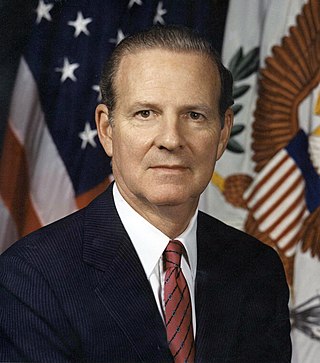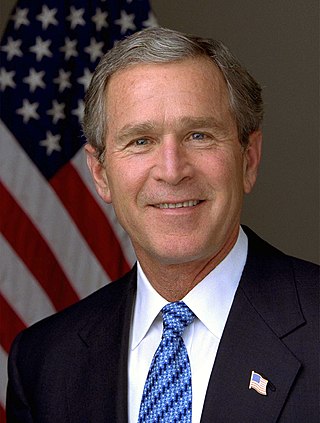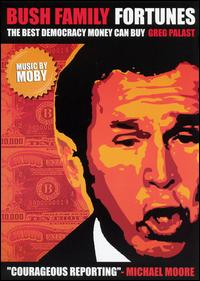
HKN, Inc. is a company engaged in hydrocarbon exploration headquartered in Southlake, Texas. It is notable for the Harken Energy scandal, which involved allegations of insider trading by George W. Bush in 1990. The company was known as Harken Energy Corporation until 2007.
The Harken Energy Scandal refers to a series of transactions entered into during 1990 involving Harken Energy. These transactions are alleged to involve either issues relating to insider trading, or influence peddling. Although no wrongdoings were found by any investigating authorities, the matter generated political controversy.
The Carlyle Group is a multinational private equity, alternative asset management and financial services corporation based in the United States with $376 billion of assets under management. It specializes in private equity, real assets, and private credit. It is one of the largest mega-funds in the world. In 2015, Carlyle was the world's largest private equity firm by capital raised over the previous five years, according to the PEI 300 index. In the 2023 ranking however, it had slipped to fifth place.
Arbusto Energy was an oil and gas exploration firm started in 1977 by former U.S. president George W. Bush. In 1984, the company merged with Spectrum 7 Energy Corp.

James Addison Baker III is an American attorney, diplomat and statesman. A member of the Republican Party, he served as the 10th White House Chief of Staff and 67th United States Secretary of the Treasury under President Ronald Reagan and the 61st U.S. Secretary of State before returning as the 16th White House Chief of Staff under President George H. W. Bush.
Joe Conason is an American journalist, author and liberal political commentator. He is the founder and editor-in-chief of The National Memo, a daily political newsletter and website that features breaking news and commentary. Since 2006, he has served as editor of The Investigative Fund, a nonprofit journalism center.
Salem bin Mohammed bin 'Awad bin Laden was a Saudi Arabian investor and businessman.
James Reynolds Bath is a Texas businessman who has business interests in aircraft sales and leasing and real estate. He is best known for his business relationships with Saudi businessmen Salem bin Laden and Khalid bin Mahfouz.
Baine Perkins Kerr was a prominent Houston lawyer who was a partner in the law firm of Baker and Botts, where he managed the corporate law department, before he joined Pennzoil.

Richard Alan Clarke is an American national security expert, novelist, and former government official. He served as the Counterterrorism Czar as the National Coordinator for Security, Infrastructure Protection, and Counter-Terrorism for the United States between 1998 and 2003.

Kent Ronald Hance is an American politician and lawyer who is the former Chancellor of the Texas Tech University System. In his role, he oversaw Texas Tech University, Texas Tech University Health Sciences Center and Angelo State University in San Angelo, Texas. He is also a lobbyist and lawyer. Hance subsequently defeated future President George W. Bush and became a Democratic member of the United States House of Representatives from West Texas, having served from 1979 to 1985. After his congressional service, he switched to the Republican Party and in both 1986 and 1990 ran for governor of Texas, losing in the primary election.
Bush Pioneers are people who gathered $100,000 for George W. Bush's 2000 or 2004 presidential campaign. Two new levels, Bush Rangers and Super Rangers, were bestowed upon supporters who gathered $200,000+ or $300,000+, respectively, for the 2004 campaign, after the 2002 McCain–Feingold campaign finance law raised hard money contribution limits. This was done through the practice of "bundling" contributions. There were 221 Rangers and 327 Pioneers in the 2004 campaign and 241 Pioneers in the 2000 campaign. A fourth level, Bush Mavericks, was used to identify fundraisers under 40 years of age who bundled more than $50,000.

George Walker Bush is an American politician who was the 43rd president of the United States from 2001 to 2009. A member of the Republican Party, he previously served as the 46th governor of Texas from 1995 to 2000.

Jason Carl Botts is an American former professional baseball left fielder, designated hitter and first baseman. He played in Major League Baseball (MLB) for the Texas Rangers, and in Nippon Professional Baseball (NPB) for the Hokkaido Nippon Ham Fighters.

Baker Botts L.L.P. is an American law firm of around 725 lawyers. Headquartered in One Shell Plaza in Downtown Houston, Texas, the firm has energy and technology related clients. It is referred to as the second-oldest law firm west of the Mississippi.

Samuel Evans Wyly is an American businessman. He first appeared on Forbes's list of richest Americans in 2000 with a net worth of $750 million, and he remained on that list throughout 2010 with a net worth of $1 billion. His initial wealth was acquired following the public offering of University Computing Company. His recent wealth stems from ownership stakes from Sterling Software and Michael's, an American art supply store. In 2010 following a series of investigations, Wyly was charged with federal tax fraud by the SEC and IRS. Following his settlement with federal authorities, and declared bankruptcy in 2014.
Houston Gulf Airport was a single-runway airport located in eastern League City, Texas, United States. Its FAA code was SPX and its IATA code was also SPX.

Robert W. Jordan is an American lawyer and diplomat. He served as the United States Ambassador to Saudi Arabia from 2002 to 2003, under President George W. Bush.

Bush Family Fortunes: The Best Democracy Money Can Buy is a 2004 documentary film directed by Steven Grandison and Greg Palast. The film, which examines various aspects of the presidency of George W. Bush, including the 2000 US presidential election and the Iraq War, is adapted from the 2003 BBC production Bush Family Fortunes and based on the 2002 book The Best Democracy Money Can Buy by investigative journalist Palast, who had spent years tracking the Bush family for the BBC and The Guardian newspaper. The research for the original BBC film, which claims to have exposed the George W. Bush military service controversy, was also drawn upon by Michael Moore for Fahrenheit 9/11 (2004) and footage was used by Robert Greenwald in Unprecedented: The 2000 Presidential Election (2002).

The Texas Rangers Major League Baseball (MLB) franchise was established in 1961 as the second incarnation of the Washington Senators, an expansion team awarded to Washington, D.C., after the old Washington Senators team of the American League moved to Minnesota and became the Twins. The new Senators remained in Washington through 1971 playing at Griffith Stadium in their first season and at RFK Stadium for the next 10 years. In 1972, the team moved to Arlington, Texas, where it became the Texas Rangers. The Rangers played at Arlington Stadium from 1972 to 1993, Globe Life Park in Arlington from 1994 to 2019. The team moved into Globe Life Field in 2020.














